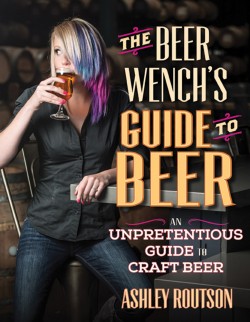The Beer Wench’s Guide to Beer: An Unpretentious Guide to Craft Beer
 As craft beer mania rolls on, so, too, does the deluge of beer primers. Primers are textbooks, educational guides written to tutor readers in the basics of craft beer culture. Primers cover beer styles (in all their irritating multiplicity), flavors and tastes; glassware; IBUs, BJCP and ABV; food pairings, etc. Peruse a primer and you, too, can board the craft beer bandwagon without, presumably, looking like an idiot.
As craft beer mania rolls on, so, too, does the deluge of beer primers. Primers are textbooks, educational guides written to tutor readers in the basics of craft beer culture. Primers cover beer styles (in all their irritating multiplicity), flavors and tastes; glassware; IBUs, BJCP and ABV; food pairings, etc. Peruse a primer and you, too, can board the craft beer bandwagon without, presumably, looking like an idiot.
Such is the intent of The Beer Wench’s Guide to Beer: An Unpretentious Guide to Craft Beer ($22.99, Voyageur Press). The subtitle says it all: Author Ashley Routson’s gonna talk to readers, not at them. Her voice is chatty, breezy—indeed, nearing gale force. That’s no doubt a calculated choice: “I assume your attention spans are as short as mine,” Routson confides, and chatty likely appeals to 20- and 30-somethings eager to enhance their hipster credibility.
Routson claims that her guide, unlike others, “relates to the way most people actually drink.” I’ve no idea how most people actually drink, so I give her the benefit of the doubt. After all, she’s an expert; I’m not. In any case, like other primers, hers is packed with facts, explanations, tutorials and, alas, a history “lesson” for each style that she discusses.
And alas: Routson’s take on history prompted the same reaction I’ve had to nearly every beer primer I’ve read: Banging head on desk while whimpering.
Please, beer writers, I beg of you, for the love of all things yeasty and delightful, moral and pure, SKIP THE “HISTORY.” Please.
Humanity will thus be spared such indignities as “Prohibition single-handedly destroyed the craft and artisanal booze industry in the United States” and “set the stage for mass production” of lager. (Banging forehead on desk even as I type those words.) Grain shortages during World War II led to “mass production of light adjunct-based domestic lagers,” “yet another reason to hate Hitler” and why the war “sucked.”
I’m none the wiser. You?
On behalf of readers everywhere, I beg of you, dear authors: Unless you’re versed in historical accuracy, don’t go there, OK? You sound like a fool and make history look bad. We’re told to treat beer with respect, right? Then do the same for beer writing and its readers.
Awful history aside, Routson’s beer primer is no better and no worse than 50 others I’ve read in recent years. The usual suspects parade the pages: beer styles, brewing process, cooking with beer, pairing food and beer, “science-y numbers” with which to impress your pals, and tasting notes aplenty.
Typical tutelage a la Routson: American pale ale is “Fresh cut grass, lemon peel, pine, and honey” in the nose; and “Grapefruit pith, pine needles, and dried hay” in the mouth. Said ale, she adds, is a worthy substitute for “Sauvignon blanc, gin martini, tonic water.”
Again, I’ll take her word for it. But … if I’m in the mood for a gin martini, why would I drink a pale ale? (On the other hand, I approve her recommendation of porter as an alternative to rum and Coke. Said booze combo is one I want banned, permanently, from this universe or any other.)
Just skip the history. Please.

Dear Editor:
I am disappointed with Ms. Ogle’s review of Ashley Routson’s The Beer Wench’s Guide to Beer.
Ms. Ogle is an accomplished historian and her book Ambitious Brew is the best history of American Beer that has been written to date, however, these credentials do not justify or excuse this unfair review and the condescending tone of this review . Ms. Ogle was apparently offended by the irreverent and chatty style employed by Ms. Routson in her Wench persona and she then used a few beer history mistakes as the basis for dismissing this book as unworthy. While it is true Ms. Routson makes a few minor mistakes in beer history and some over simplifications, a fair reviewer should consider the book as a whole rather than basing the review on some errors that are somewhat insignificant.
I have read the Wench’s Guide and I found it very good “first” book for anyone new to beer or someone who has never read a guide book on beer. It is after all a guide to beer and not a history lesson. Despite Ms. Ogle’s opinion, the subjects covered are essential for a guide such as this and are important in to an understanding of beer. The Wench’s style make the book a “fun read” despite the quantity of information provided. Better yet, the Wench’s descriptions and opinions about styles, commercial examples, and beer and food pairing are sound and reliable.
By design, this book is aimed at a younger group than Ms. Ogle (and me) and the craft beer world needs this group especially young women if it is to continue to grow. For too long, beer, even craft beer, has been the almost exclusive province of men. This must change and I hope this book will introduce more women to this fascinating beverage and its many styles.
Candidly, I think Ms. Ogle embarrassed herself by her arrogance and obvious dislike for the Wench persona. I hope Ms. Ogle did not intend to come across as a humorless older person offended by a younger one who dared to write a book, but she did. She should apologize.
Gerald D. Jowers
BJCP Certified Judge (15 years)
Beer Columnist (Columbia, SC) Free Times (8 years)
Member NAGBW
Attorney at Law